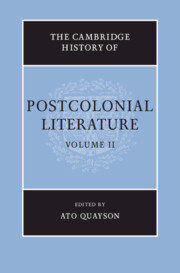Book contents
- Frontmatter
- 21 The language question in India and Africa
- 22 English and the development of postcolonial literature
- 23 Religion and postcolonial writing
- 24 Postcolonial responses to the Western canon
- 25 Island writing, Creole cultures
- 26 Magical realism
- 27 Palimpsest and hybridity in postcolonial writing
- 28 The narrative forms of postcolonial fiction
- 29 Poetry and postcolonialism
- 30 Primitivism and postcolonial literature
- 31 Popular culture and postcolonial literary production in Africa and India
- 32 Film and postcolonial writing
- 33 Fanon, Memmi, Glissant and postcolonial writing
- 34 Negritude and postcolonial literature
- 35 Publishing, prizes and postcolonial literary production
- 36 Key journals and organizations
- Bibliography
- Index
- References
33 - Fanon, Memmi, Glissant and postcolonial writing
Published online by Cambridge University Press: 28 January 2012
- Frontmatter
- 21 The language question in India and Africa
- 22 English and the development of postcolonial literature
- 23 Religion and postcolonial writing
- 24 Postcolonial responses to the Western canon
- 25 Island writing, Creole cultures
- 26 Magical realism
- 27 Palimpsest and hybridity in postcolonial writing
- 28 The narrative forms of postcolonial fiction
- 29 Poetry and postcolonialism
- 30 Primitivism and postcolonial literature
- 31 Popular culture and postcolonial literary production in Africa and India
- 32 Film and postcolonial writing
- 33 Fanon, Memmi, Glissant and postcolonial writing
- 34 Negritude and postcolonial literature
- 35 Publishing, prizes and postcolonial literary production
- 36 Key journals and organizations
- Bibliography
- Index
- References
Summary
Frantz Fanon, Albert Memmi and Édouard Glissant are three creative thinkers who share something of a common Weltanschauung. Without taking the more extreme definition from Freud that the latter is the unified solution as generated from a particular perspective of all the problems of the universe, certainly the centrality of the colonial encounter with otherness forms the overt structuring factor for the worldview of each of these formidable intellectuals. However, their creative paths would take different form. The themes that stage the encounter and the timbre of the voice of otherness in the texts of these intellectuals prove to be quite different in each case. In this chapter I will consider the oeuvre of these thinkers as together forming an aesthetic corpus that anticipates the transnational aspirations of a range of postcolonial francophone writers of encounter.
A defining moment: literary history and the theme of encounter
In considering this material historically I am reminded of Walter Benjamin’s idea that:
Thinking involves not only the movement of thoughts but their arrest as well. Where thinking suddenly stops in a constellation saturated with tensions, it gives that constellation a shock, by which thinking crystallizes into a monad… In this structure [the historicist materialist] recognizes the sign of a messianic arrest of happening, or (to put it differently) a revolutionary chance in the fight for the oppressed past. He takes cognizance of it in order to blast a specific era out of the homogenous course of history.
- Type
- Chapter
- Information
- The Cambridge History of Postcolonial Literature , pp. 1068 - 1099Publisher: Cambridge University PressPrint publication year: 2012
References
- 1
- Cited by



